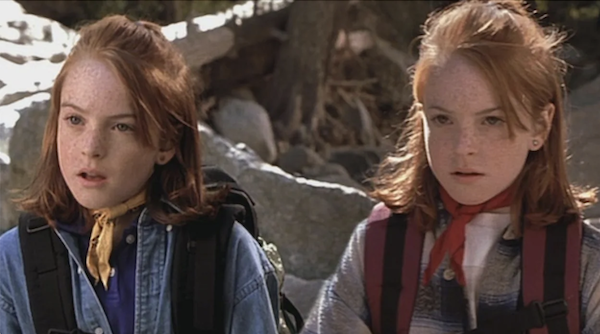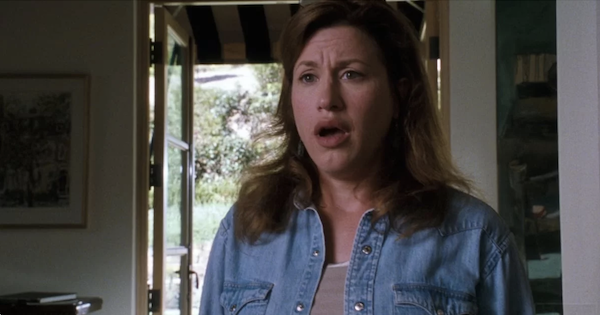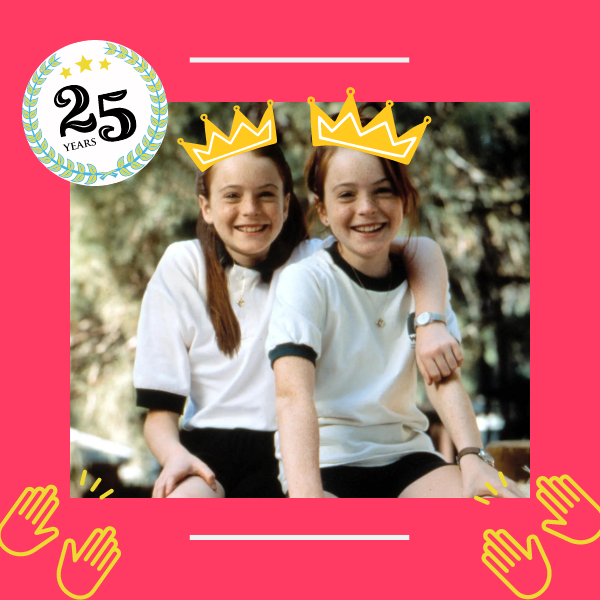I don’t remember the first time I watched The Parent Trap, but the movie came out in 1998—the same year my own parents divorced—and it made quite an impression on 8-year-old me. The film became a beloved fixture of my childhood, and, 25 years later, it’s now a nostalgic comfort movie in my adulthood. Whenever I need a good cry, all I have to do is watch that rainy Isolation Cabin scene when Annie says to Hallie in her precious British accent: “Hallie, we’re not sisters; we’re twins!” (Nevermind that this camp’s response to preteen girls being unbearably cruel to each other is to lock them in a cabin with no supervision. It’s what they needed!)
Now in its 25th anniversary year, this family romantic comedy introduced the brilliant 12-year-old Lindsay Lohan as twins Hallie and Annie, who meet at an incredibly fun and out-of-control summer camp, discover they’re sisters, then switch places in an effort to get their divorced parents back together. “Romcom queen” Nancy Meyers co-wrote and directed the film (in her directorial debut, no less) which might explain the female gaze that makes the story feel like such a rare gem in a landscape of movies that tended to center around boys or dads struggling to do the right thing (for instance: 1992’s Beethoven or 1993’s Free Willy) or girls who are trapped (like 1995’s A Little Princess). Honestly, all I was watching in the 90s were Disney princesses literally chasing down men because their lives and/or voices depended on it, so The Parent Trap was a whole new age-appropriate take on what a girl was capable of.
The Parent Trap is the perfect balance of a completely unrealistic story world with all-too-real emotions (as all good movies should be, right?). The zaniness of Hallie’s and Annie’s world was an exciting escape for little regular ol’ me. Watching it repeatedly as a kid, I soaked up all kinds of misinformation, like how you can fly from London to California without any zapping of important grownup-affairs-meddling energy, or that an expensive summer camp is the totally accessible apex of preteen existence. I also accepted the idea that two people who are literally identical can reasonably coexist for multiple days without suspecting they’re related, as well as the premise that separating your children at birth is a mild offense at worst but totally forgivable if you’ve got your career to consider.
Meyers also expertly crafts totally unbelievable circumstances in a way that makes you lean in and go, “Hell yeah, this super rich conniving future stepmom is absolutely going to say yes to a camping trip with these girls.”

And then the heartfelt moments: like when Annie can’t stop saying “dad” after meeting him for the first time (unbeknownst to her dad, played by Dennis Quaid) or when Hallie wisely reflects that her mom (played by Natasha Richardson) is “too cool” during an excessively blissful montage of a wedding dress photoshoot. (Side note that Hallie was the girl I wanted to be as a kid. She had me from the moment she showed up at camp in her jean jacket and sunglasses and coolly said about a fellow camper: “Now that’s my kind of woman!”) But the most impactful tear-jerking scene has to be when housekeeper Chessy (played by Lisa Ann Walter, now known for her role on Abbott Elementary) blubbers at the realization that the girl she thinks is Hallie is actually Hallie’s long-lost twin Annie.

The Parent Trap has inspired some concern over its messaging to kids of divorced parents, a.k.a. the “you can get your parents back together and find happiness” idea. But honestly, the story world is so bonkers that this message was never one that I received, even though I watched the film as an 8-year-old with actively divorcing parents. It’s obvious in the movie that the twins’ parents—who inexplicably chose to separate their children for life despite being generally reasonable human beings with luxurious financial freedom—do in fact still love each other. (Truly the most irrational breakup of all-time.) I was younger than Annie and Hallie when the movie came out, but still wise enough to understand that getting back together was not in the cards for my own parents.
My takeaways from The Parent Trap were more empowering ones. Hallie and Annie were both self-assured and in control of their actions. They weren’t just little girls at a camp; they were in charge of their own destinies, thank you very much. They lived in a world of organization, solutions, and fun without dire consequences, which was everything young me wanted in life. And newcomer Lindsay Lohan was a refreshing presence in my 90s screen time. Her iconic smirk and raised eyebrows said that she was a new kind of girl who had all the answers to life but was too cool to tell them to you.
I learned from The Parent Trap that friendship and creative problem-solving can be just as romantic as—and way more exciting than—love felt between grownups. And ultimately? Message received that girls with a plan can accomplish literally anything.
Happy 25th Anniversary to Hallie and Annie, the most competent 11-year-olds in cinematic history.


